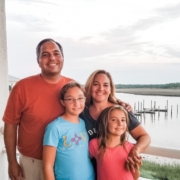From neuropsychologist to young adult novelist
Northern California resident Katie Keridan spent the first 12 years of her professional career as a neuropsychologist. Following her schooling, she served as a predoctoral intern at the Kennedy Krieger Institute at Johns Hopkins University School of Medicine in Baltimore, then moved on to become a postdoctoral research fellow and licensed clinical psychologist at Children’s National Health System in Washington, D.C. In 2017, she moved to California and started a private practice. She also was a member of the National Academy of Neuropsychology (NAN); the first annual conference she attended was in Vancouver, B.C., in 2010. During the Covid-19 pandemic, Keridan made a major life change, setting aside psychology and psychometric analysis for a new career as a young adult novelist. Since the switch, Keridan has published two full-length fantasy books for young adult readers, and she has already finished her third book in the series. The books and characters in them benefit from Keridan’s knowledge of psychology and neuropsychology. BrainWise Managing Editor Matt Villano recently caught up with her to talk about her journey and what’s next. What follows is an edited transcript of their interview.
BrainWise: Making the leap from neuropsychology to YA fiction is not a very traditional path. What prompted this transition?
Katie Keridan: Yeah. Who would go from being a doctor to a young adult fantasy author? Oh wait, that would be me. I have always loved to write, always. I mean, some of my earliest memories are of me taking paper and folding it and stapling it and making little books. And I’d go through and I’d write about these wild adventures I had as a child growing up on a ranch in Texas. And then I would illustrate my own little written books. However, I was the first person in my family to go to college and thinking about a career that is going to be sustainable, writing was not really up there at the top of what my parents hoped to see me do. Since my parents were paying for me to go to college, they had a real vested interest in what I was going to major in and what I was going to do. Probably because I love creating characters and I love figuring out how people think, psychology was a natural fit for me. I loved figuring out what’s going on for someone and how I can meet them where they’re at and help them. Neuropsychology is even a further branch off that, figuring out what’s going on in this child’s brain so that we can meet them where they’re at and help them and connect them with the resources that they need to be as successful as they possibly can. I loved the career that I developed, it was fantastic. The best part was obviously working with kids and their families. The worst part was insurance and billing and figuring out how you are going to help these people who are coming into your office today. I was very fortunate—once I moved to California and got into private practice, I had time to delve more into the writing that I wanted to do. And I thought, ‘40 is approaching swiftly on the horizon, why am I sitting around here waiting, thinking someday it would be fun to try to write a book? Let’s go for it. Let’s just try and put it out there.’ I connected with a great writing team. My first book, Reign Returned: The Felserpent Chronicles, Book 1, came out last year in 2022 and then the sequel, Blood Divided: The Felserpent Chronicles, Book 2, just came out October 3rd 2023. The final book in the trilogy has a publication date of October 2024. So, it’ll be three books in three years.

BrainWise: How did the first book come to life?
Keridan: That book started while I was still on the East Coast. I’d have these little moments where I knew these characters, I knew this was a story I wanted to tell and so in my spare time I would write little snippets. Sometimes the only writing I would do would be from 11 p.m. to midnight or midnight to 1 a.m. during the week because you’re working all day long and you have to find these bits of times to write when you can. The more I started doing it and letting that part of myself come out and breathe, the harder it was to keep putting it back into the box. Because the story started taking on a life of its own. So, it has been with me for a few years.
I really wasn’t sure what COVID would mean for the publishing industry at all. Thankfully with my first book coming out last year, I was fortunate that [Covid-related] shipping issues didn’t really affect it. Most of the worst had passed, bookstores were back to doing in-person events. [Once the book came out,] I had to figure out some changes. Was I going to pursue [writing]? Was I going to stick with what I had gone to college for, what I had decided was going to be my chosen career?
It was scary to make the transition, but it was incredibly exciting. Now that I’m at a point where I have two books out and I’m connecting with readers and starting to get feedback, it’s such a privilege to know that people enjoy the work and enjoy what I’m putting out there.

BrainWise: To what extent does neuropsychology play a role in your books?
Keridan: I try hard to include accurate mental health representations in my writing because that’s my background. And I would be remiss if I didn’t bring that into creating characters that I want readers to see. Anxiety doesn’t just have to look one way, depression doesn’t just have to look one way, trauma and processing, it doesn’t have to just look one way. And that’s been so incredibly rewarding.
We’re in a position in publishing right now where despite all of the really horrible things going on with book bans and libraries closing and school libraries closing, there’s never been a greater interest in accurate mental health representation. Ware getting a lot of own voices coming out and talking about their experiences—not just, ‘Here’s what happened to me,’ but instead, ‘Here’s what happened to me through the lens of this character that I created so that other people can better understand what it was like to go through this.’ Just as one example, my main character, Sebastian, was a victim of abuse as a child and I pulled directly from my own life experiences with that, having grown up in a very abusive, chaotic home. I wanted to show a character who thinks they’ve worked through this when they’re just ignoring it. Now that they’re in this new relationship with someone they love, they have to figure out what it means to be vulnerable? How do I open up about this trauma that I’ve experienced? What is my partner going to think if I have a nightmare and I wake up screaming? I’m just going to die of embarrassment. All these things that young adults go through, new relationships, big life changes—but experiencing that through characters who have a neurological or a neuropsychological diagnosis has been incredibly fun for me. And I love that I can reach so many more people than I could [as a neuropsychologist]. It is always a trade-off when you do cognitive testing with families, there’s a part of me that feels like I become part of that family, and they never leave me. The nice thing about writing a book is I can reach more people, the downside is it’s less personal than what I did before.
BrainWise: What was the most challenging aspect of leaving behind a career you had worked so hard to achieve?
Keridan: I have a Ph.D. That’s usually anywhere from five to seven years, then you do an internship. I did a two-year research fellowship. So, we’re talking into the double digits of [years of] schooling and commitment to [neuropsychology]. I think the biggest part was that I was more worried what other people were going to think of me for making this change. Thinking about looking around the room at my professional colleagues who have all these letters after their name and saying, ‘Hello, I’m going to be working on a YA fantasy novel.’ Just being able to believe in myself that I could do this and that I was not less-than for making a change—that was a challenge.
I’ve had some people ask, ‘Do you think you chose the wrong career? Do you think you went into the wrong field?’ Never. I love the education I got, I love the experiences I had, and the people that I connected with. Honestly, I don’t think I’d be writing the books that I am if I hadn’t had those experiences. We never know how things are going to play out ever. I’ve become so much better about trusting my instinct, listening to myself, and just going for it. I’m trying to be a little less of a Type-A Capricorn and a little more just go with the flow.
BrainWise: Can you please tell us a little about the series and what the enduring storylines are all about?
Keridan: In the first book, Reign Returned, we have an enemies-to-lovers story, because I’m a huge fan of [stories where] there’s all this conflict and we hate each other, [and then,] surprise, we’re actually going to fall in love. I’m a big fan of tropes in general. Some people will say they’re cheesy, I also say there’s a reason why they sell, and if it ain’t broke, don’t fix it. So, in the first book, we have a former king and queen who, before they die, bind their souls together and promise to return when it’s time to retake their kingdom and find one another. Centuries pass, they’re both reborn, but they come back with no knowledge of who they used to be, and they come back on warring sides. The first book is really about remembering the past in order to change the future. The second book comes around and my main characters have remembered their past, they know who they used to be, they know that they’re back and they’re ready to reunite the realms, but it’s not going to be that easy because…well, what would be the fun in that? So, they are back, and their arch enemy is back as well. This is really a story of found family, of figuring out who you are and who you want to be and gathering the support that you need in your life to make that happen.

BrainWise: Have you written the third book yet?
Keridan: Yes. The third book is currently undergoing proofreading. Without going into all the details here, with book three, I’m a huge fan of happily ever after, so I can tell you there is going to be a happily-ever-after. Our characters learn, they grow, family secrets are discovered, betrayals are survived. But in the end, as we always hope it does, good wins out and triumphs. [The book is scheduled to come out in October 2024.]
BrainWise: Now that your first series is behind you, what’s next?
Keridan: I’m working with an organization called The Novelry, because my next project is a middle grade book. This one is near and dear to my heart because my main character in this book is an 11-year-old girl with high-functioning autism. It’s a contemporary book, so it’s set in the present day, but there is a little bit of a dash of magic in there. I am incredibly excited. I’ve loved the young adult, YA, fantasy world, after three books, I needed a break because that’s a lot of plot lines and characters and layers to work through. I’m about three-fourths of the way done with this next book, and it will be for younger readers, which I’m really excited about.
[Another one] of the things I’m really excited about for 2024 and beyond is to have the opportunity to do more teaching. I am very fortunate that I have some fun events lined up for 2024, such as the San Diego Writers Festival. There’s a couple of different things that I can’t mention yet because they’re still potentially in the works. Writing is such a solitary activity. I mean, in the midst of it, it’s me with my laptop just sitting here with all these characters in my head. So, when I can get out in the real world and start connecting with readers and seeing people face-to-face, that’s so much fun. And I love that chance to interact and to hear something that they enjoyed about a book or a character.
BrainWise: To what extent are you keeping up with what’s happening in the world of neuropsychology?
Keridan: I could never fully disconnect from the brain community, no matter what. Even if I hit No. 1 on The New York Times Best Seller list, I will still be reading what’s happening with neuropsychology and especially pediatric neuropsychology. Any kind of breakthroughs involving kids, anything specifically related to oncology or autism or intellectually gifted kids who also have clusters of other things going on, I’m always paying attention to that and reading what I can because we need breakthroughs now more than ever. Especially since the pandemic, what kids have been facing from a mental health perspective, I don’t think we’ll fully even begin to understand it for years to come. But kids need services and support more than ever.

BrainWise: Do you ever see yourself going back into neuropsychology full-time?
Keridan: You just never know. I never thought I’d be sitting here doing this right now. But I will say I’m not actively seeing patients, I’m not actively taking on any cases or doing any neuropsychological testing at this point. Who knows? I would love to find a way to combine [writing and neuropsychology], whether it’s at a college-level class, to be able to talk about books and reading and brains and how this all goes together. Or it might just be a workshop that I put out. I’m going to think about that.
BrainWise: In conclusion, what advice can you offer others who are contemplating a career change, whatever their current careers might be?
Keridan: There comes a point where we have to decide, who are we living for? Are we living this life to make other people happy and do what we think they think we should do, or are we living this life for ourselves and figuring out how can we make the greatest contribution and connect with people? For me, growing up, books were an escape, they helped me stay sane. When I couldn’t leave the situation I was in, at least I could mentally check out and I had friends in books. That’s what I want to offer people today. Like saying, ‘Here’s a safe place where you can see someone, they might not be just like you, but there’ll be similarities and you can see yourself reflected on that page.’ We need more of that, it’s priceless.
This essay has been factchecked by members of NAN’s Publications Committee. For more about that process, click here.









